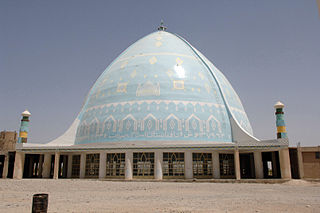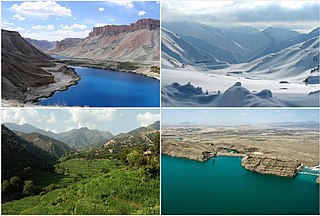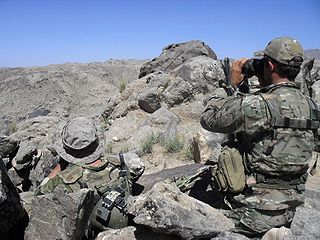
Kandahar is a city in Afghanistan, located in the south of the country on the Arghandab River, at an elevation of 1,010 m (3,310 ft). It is Afghanistan's second largest city after Kabul, with a population of about 614,118. It is the capital of Kandahar Province and the centre of the larger cultural region called Loy Kandahar. Kandahar is the founding city and spiritual center of the Taliban. Despite the capital of Afghanistan being Kabul, where the government administration is based, Kandahar is the seat of power in Afghanistan as the supreme leader and his spiritual advisers are based there. Kandahar has therefore been called the de facto capital of Afghanistan, though the Taliban maintain Kabul is the capital.
Mullah Mohammad Rabbani Akhund was one of the main leaders of the Taliban movement who served as Prime Minister of Afghanistan from 1996 to 2001. He was second in power only to the supreme leader, Mullah Mohammed Omar, in the Taliban hierarchy.

Zabul is one of the 34 provinces of Afghanistan, located in the south of the country. It has a population of 249,000. Zabul became an independent province from neighbouring Kandahar in 1963. Historically, it was part of the Zabulistan region. Qalat serves as the capital of the province. The major ethnic group are Pashtuns. Primary occupations within Zabul are agriculture and animal husbandry.

Gul Agha Sherzai, also known as Mohammad Shafiq, is a politician in Afghanistan. He is the former governor of Nangarhar province in eastern Afghanistan. He previously served as Governor of Kandahar province, in the early 1990s and from 2001 until 2003. In October 2013, Sherzai resigned from his post as governor and formally announced himself as a candidate for Afghanistan's 2014 Presidential Election, and served as the minister of border and tribal affairs until the Taliban victory in 2021.

Kandahār is one of the thirty-four provinces of Afghanistan, located in the southern part of the country, sharing a border with Pakistan, to the south. It is surrounded by Helmand in the west, Uruzgan in the north and Zabul Province in the east. Its capital is the city of Kandahar, Afghanistan's second largest city, which is located on the Arghandab River. The greater region surrounding the province is called Loy Kandahar. The Emir of Afghanistan sends orders to Kabul from Kandahar making it the de facto capital of Afghanistan, although the main government body operates in Kabul. All meetings with the Emir take place in Kandahar, meetings excluding the Emir are in Kabul.

Spin Boldak is a border town and the headquarters of Spin Boldak District in the southern Kandahar province of Afghanistan, next to the border with Pakistan. It is linked by a highway with the city of Kandahar to the north, and with Chaman and Quetta in Pakistan to the south. Spin Boldak has the second major port of entry between Afghanistan and Pakistan, the Wesh-Chaman border crossing. It is also a major transporting, shipping and receiving site between the two neighboring countries.

The Hotak dynasty was an Afghan monarchy founded by Ghilji Pashtuns that briefly ruled portions of Iran and Afghanistan during the 1720s. It was established in April 1709 by Mirwais Hotak, who led a successful rebellion against the declining Persian Safavid empire in the region of Loy Kandahar in what is now southern Afghanistan.

Dadullah was the Taliban's most senior military commander in Afghanistan until his death in 2007. He was also known as Maulavi or Mullah Dadullah Akhund. He also earned the nickname of Lang, meaning "lame", because of a leg he lost during fighting.
Operation Mountain Thrust was a NATO and Afghan-led operation in the War in Afghanistan, with more than 3,300 British troops, 2,300 U.S., 2,200 Canadian troops, about 3,500 Afghan soldiers and large air support. Its primary objective was to quell the ongoing Taliban insurgency in the south of the country.

Ahmad Shah Baba International Airport, also referred to as Kandahar International Airport, and by some military officials as Kandahar Airfield, KAF), is located in the Daman District of Kandahar Province in Afghanistan, about 9 NM southeast from the city of Kandahar. It serves as the nation's second main international airport and as one of the largest main operating bases, capable of housing up to 250 aircraft of different sizes. The current head of the airport is Maulvi Fathullah Mansour.

Operation Mountain Fury was a NATO-led operation begun on September 16, 2006 as a follow-up operation to Operation Medusa, to clear Taliban insurgents from the eastern provinces of Afghanistan. Another focus of the operation was to enable reconstruction projects such as schools, health-care facilities, and courthouses to take place in the targeted provinces.
The following lists events that happened during 2004 in Afghanistan.
The 2008 Kandahar bombing of February 17, 2008 in Kandahar, Afghanistan, was an attack targeting a crowd of people watching a dog-fighting competition. With more than 100 killed, it was the deadliest attack on Afghan soil since 2001.

Tourism in Afghanistan is regulated by the Ministry of Information and Culture. There are at least 350 tourism companies operating in Afghanistan. Tourism was at its peak before the 1978 Saur Revolution, which was followed by the decades of war. Between 2013 and 2016, Afghan embassies issued between 15,000 and 20,000 tourist visas annually.
Events from the year 2010 in Afghanistan.

The Shah Wali Kot Offensive was a five-day joint operation during the War in Afghanistan, conducted by Australian special forces and the Afghan National Army with US air support, between 10 and 14 June 2010. The operation took place in the Shah Wali Kot District of Kandahar Province, occurring in preparation for the coalition clearance of the province and resulting in heavy insurgent casualties.
Operation Dragon Strike was a NATO counter-insurgent mission in Kandahar province, Afghanistan, against Taliban forces, which started on September 15, 2010.

Abdul Raziq Achakzai, also known as General Raziq, was the chief of police for Kandahar Province. Many Afghans regarded him as a national hero while others viewed him simply as a warlord. In late 2001, Achakzai became a member of Gul Agha Sherzai's forces whom the Taliban had surrendered to after the U.S. invasion of Afghanistan. Achakzai was considered to be one of the most powerful security officials in Afghanistan for the last few years of his life.

The Battle of Kandahar began on 9 July 2021, as Taliban insurgents assaulted the city to capture it from the Afghan National Security Forces (ANSF). After heavy fighting for weeks the city's defenses had started to dissolve in August. This allowed the Taliban to enter and overrun most of the city on 12 August 2021, including the Sarposa prison, which included the release of over 1,000 prisoners, and ultimately the capture of the city. However, the siege for the nearby airport continued, where government loyalists held out until being evacuated on 16 August.













